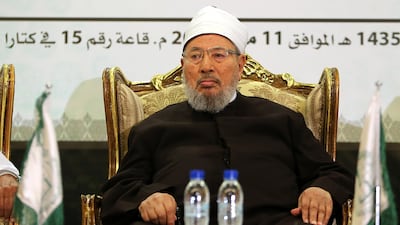It is the height of the summer season in Britain and it is virtually impossible to visit an iconic venue that is not associated in some way or another with Qatar.
Harrods, Royal Ascot and Glorious Goodwood are just some of the archetypical names that are either owned or sponsored by the Qataris, who also have billions of dollars invested in various UK assets. A recent survey, for example, found that Qatari investors now own three times more property in the capital than the Queen.
The range and scale of Qatar's massive investment in Britain means that senior Qatari officials can expect a warm reception within the highest echelons of the British government whenever they visit London, a privilege senior members of the Qatari royal family have been quick to exploit since the start of the diplomatic breach with their Gulf neighbours.
Sheikh Mohammed bin Abdulrahman Al Thani, Qatar's foreign minister, was the first senior official from the Gulf region to visit British foreign secretary Boris Johnson in London after the imposition of last month's land and air embargo against Qatar over its links with Islamist terrorist groups. And the Qatari foreign minister has been back in London this week to speak at Chatham House, the prestigious think tank on international affairs.
But while senior Qatari officials are keen to make use of their ready access to the upper reaches of the British establishment, they are less forthcoming about their ties to extremist groups that pose a direct threat to the security of the British state.
Many headlines in the international media concerning the ultimatum Qatar has received from a number of Arab countries over the state's links to extremists have tended to concentrate on the demands for Doha to close the Al Jazeera television network, as well as scaling back its links with Iran.
But British intelligence officials are also taking a keen interest in the list of 59 names and 12 entities that four Arab countries – theUAE, Saudi Arabia, Bahrain and Egypt – have accused of having links to terrorism and enjoy Qatari support.
They are particularly interested in the suggestion that Qatar is supporting Abdulhakim Belhaj, a former Libyan Islamist commander.
These days Belhaj is a leading figure in Libya's conservative Islamist Al Watan Party, as well as being the former head of Tripoli's military council.
Al Watan, which was founded after the overthrow of Libyan strongman Muammar Qaddafi in 2011, has close ties to Yusuf Al Qaradawi, the radical Egyptian head of the Muslim Brotherhood who regularly appears on Al Jazeera to defend the use of suicide bombers.
But it is Belhaj's links with the now disbanded Libyan Islamic Fighting Group (LIFG) that continues to interest British intelligence officials, especially after it was revealed that the father of Salman Abedi, the terrorist responsible for the recent suicide bomb attack in Manchester that killed 22 people, was also a member of the LIFG.
Ramadan Abedi, the bomber's father, who spent many years living in exile in Britain before returning to Libya, was a direct contemporary of Belhadj in the LIFG, an extremist Islamist group that sought to overthrow Qaddafi's regime during the 1990s.
Following the Manchester bombing it was revealed that Salman Abedi had made several visits to Libya prior to carrying out the atrocity and British security officials are now investigating his links to Islamist groups based in Libya prior to carrying out the attack. One line of inquiry is that Abedi made contact with Libyan-based Islamists shortly before carrying out the attack.
The other reason British intelligence officials are taking a close interest in the Arab states' allegations that Qatar is supporting Belhaj is that the Libyan extremist is currently in the process of taking legal action against Jack Straw, the former British foreign secretary and the intelligence service MI6 over allegations that they participated in the 2004 kidnapping of Belhaj and his wife.
The couple claim they were abducted in Bangkok by the CIA and then flown back to Libya, where Belhaj claims he was imprisoned and tortured regularly by Qaddafi loyalists. They have now launched legal action in Britain claiming that they were only detained after Sir Mark Allen, then head of counter-terrorism at MI6, tipped off the CIA about their whereabouts. Mr Straw, who as foreign secretary oversees the work of MI6, is also accused of being involved in the CIA's rendition of Belhadj and his wife to Libya.
Sir Mark formed a close relationship with Gaddafi after he helped to persuade the Libyan dictator to give up Libya's nuclear weapons programme in 2003. As part of the deal, Britain and Libya agreed to cooperate in the global war against Islamist extremists.
Last year Britain's Crown Prosecution Service decided there was insufficient evidence to prosecute Sir Mark, but a recent ruling by the Supreme Court in London concluded that Mr Straw, MI6 and the British government must still defend claims that they participated in Belhaj's abduction.
The accusations that Doha is helping to fund Belhaj and other Islamist extremists opposed to Britain will certainly cause enormous embarrassment for the Qataris, who make much of their pro-British credentials. For, far from being the Anglophile nation that likes to invest its vast energy wealth in iconic British institutions, the accusations that Qatar is sponsoring groups and individuals linked to terrorist acts like the Manchester bombings suggests the country poses a direct threat to the security and safety of the British people.
Con Coughlin is the defence and foreign affairs editor of London's Daily Telegraph


